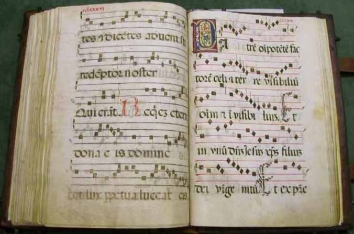
Konference "Rytmus v hudbě a uměních v pozdním středověku"
Ve dnech 16. až 18. listopadu 2020 se bude virtuálně konat mezinárodní konference "Rytmus v hudbě a uměních v pozdním středověku", neformálně známá také jako konference cantus fractus, ačkoliv na fenomén cantu fractu omezená není. Konferenci pořádá Masarykův ústav a archiv AV ČR spolu s Filosofickou fakultou UK.
Detailní program ke stažení zde (pdf). POZOR: v PDF je chyba! První session ve středu má o 30 minut více (tři příspěvky místo dvou), všechno další je o 30 minut posunuto, tj. závěrečná diskuse bude končit v 19:30.
Abstrakty jednotlivých příspěvků (pdf)
Konference se koná v následujících časech:
Pondělí 16. 11. 2020, 15:00--19:30 CET
Úterý 17. 11. 2020, 15:00--19:30 CET
Středa, 18. 11. 2020, 15:00-19:30 CET
přes ZOOM, v anglickém jazyce.
Pokud si přejete se zúčastnit, vyplňte prosím registrační formulář:
https://forms.gle/YCFr2ArMqz8uP45a9
Požadované údaje jsou emailová adresa, jméno, a institucionální příslušnost (klidně i N/A nebo soukromá firma, pokud nejste zrovna zaměstnanci univerzit či studenti). V den konference vždy obdržíte na uvedený e-mail příslušný Zoomový odkaz.
AKTUALIZACE: Záznam z konference je k dispozici jako playlist na YouTube.
CONFERENCE PROGRAM
Monday, 16. 11. 2020, 15:00–19:30 CET
15:00–15:15 Conference Opening and Instructions
15:15–16:15 Cantus Fractus Repertory in the Period of Konstanz and Basel Councils
Chair: Paweł Gancarczyk, Polish Academy of Sciences
Cantus Fractus in CA 6 and 11 and the Council of Basel
Barbara Haggh-Huglo, University of Maryland, College Park
Cantus Fractus in Vernacular Chant of the 1420s: Lost Genres and Transcription Challenges
Hana Vlhová-Wörner, Czech Academy of Sciences
16:15–16:30 BREAK
16:30–17:30 Rhythm and Notation
Chair: Luisa Nardini, University of Texas in Austin
How the Rhythm Was Lost: Progressive Decline of Nuance in Beneventan Notation
Giulio Minniti, Harvard University
Rhythm and Revision
Miriam Wendling, Katholieke Universiteit Leuven
17:30–18:00 BREAK
18:00–19:30 Keynote
The Vestiges of an Elusive Artistic Circle: Plainchant Embellishments at Tournai Cathedral from the Fourteenth through Sixteenth Centuries.
Sarah Long, Michigan State University
Tuesday, 17. 11. 2020, 15:00–19:30 CET
15:00–16:00 The Rhythm and the Arts
Chair: Hana Vlhová-Wörner
Rhythm and Architecture in Prague around 1400: Changing Architecture Paradigmas at St. Vitus' Lodge
Klára Benešovská, Czech Academy of Sciences
Visions, Apparitions and Body Movements: Work Rhymes and Work Rhythms in the Scandinavian Poetry of the Viking Age
Jiří Starý, Charles University Prague
16:00–16:30 BREAK
16:30–18:00 Rhythm in Late Medieval Song,
Chair: TBC
Reconstructing Rhythm in Central European Songs with Chant Notations
Jan Ciglbauer, Charles University Prague
From Judgement to Comfort: Audi tellus, audi magni maris limbus in the Sixteenth Century
Allen Scott, Oklahoma State University
Poetry, Prosa and Regular Rhythmic Structures in Music around 1400
Canticum boemicale Otep myry in the Context of Credo Settings in Cantus Fractus
Lenka Hlávková, Charles University Prague
18:00–18:30 BREAK
18:30–19:30 Performance Workshop with Corina Marti, Schola Cantorum Basiliensis
Wednesday, 18. 11. 2020, 15:00–19:00 CET
15:00–16:30 Repertory and Genres
Chair: Lenka Hlávková
Monophonic Credos and their Cultural Background in the Late Medieval Period
(1300–1500)
Harrison Russin, Duke University
Cantus Fractus in a Hussitic Graduale from Kutná Hora (A-Wn 15501)
David Merlin, University of Vienna
Cantus Fractus in South Tyrol
Giulia Gabrielli, University of Bolzano
16:30–16:45 BREAK
16:45–17:45 Late Transmissions and Developments
Chair: Jan Ciglbauer
Rhythmic Chant and Chant-Based Polyphony in the Annaberg Choirbooks
Paul Kolb, Katholieke Universiteit Leuven
An Early Cantus Fractus Complete Mass Ordinary by an Italian Nobleman
Kathleen Sewright, Winter Springs, Florida
17:45–18:00 BREAK
18:00–19:30 Closing Discussion



